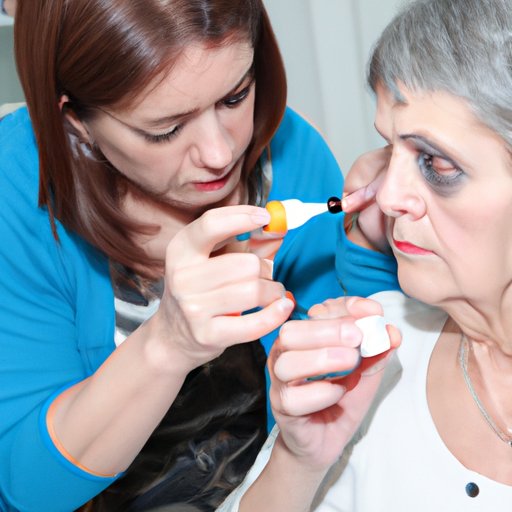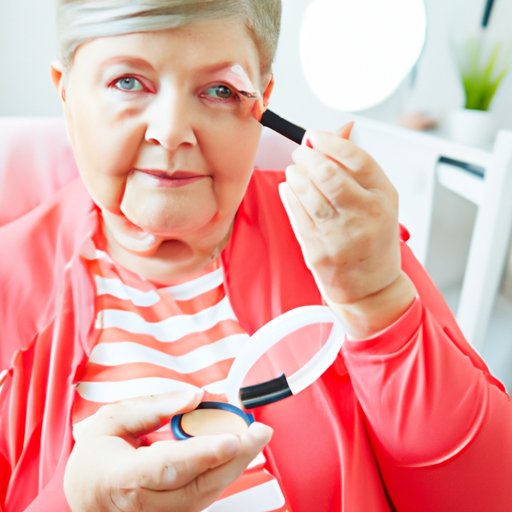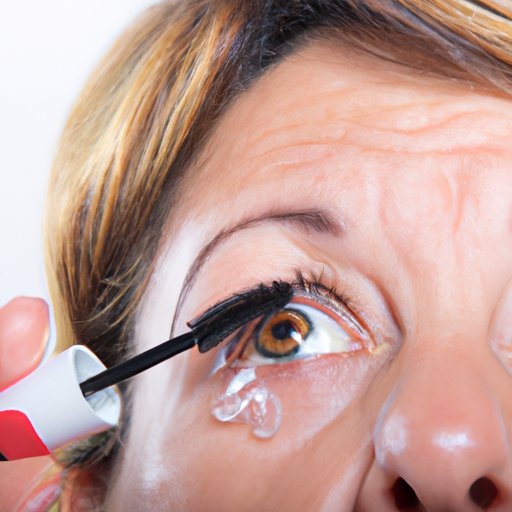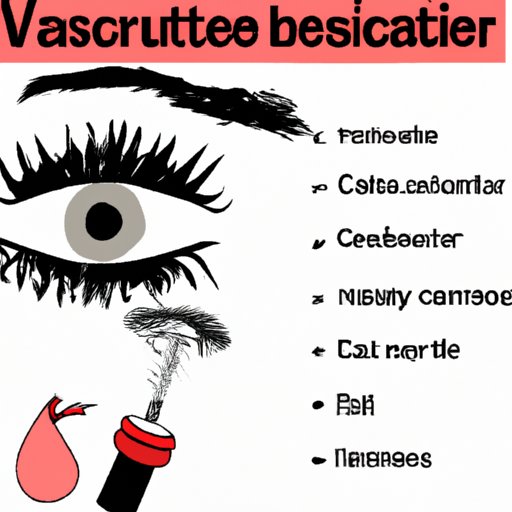Introduction
Cataract surgery is one of the most common elective surgeries in the world, with over 3 million procedures performed annually in the United States alone. As a result, many people are curious about whether it is safe to wear mascara after cataract surgery. This article will explore the safety of wearing mascara after cataract surgery, as well as provide tips for applying it safely.

Exploring the Safety of Wearing Mascara After Cataract Surgery
Understanding the Healing Process After Cataract Surgery: Before exploring the safety of wearing mascara after cataract surgery, it’s important to understand the healing process that takes place following cataract surgery. During the procedure, a surgeon makes an incision in the eye, removes the cataract-affected lens, and replaces it with an artificial intraocular lens (IOL). The eye then needs time to heal from the procedure. Immediately following the surgery, patients may experience some discomfort and light sensitivity. Most surgeons recommend taking a few days off from work or school after the procedure and avoiding strenuous activities for the first week.
Determining When It’s Safe to Wear Mascara After Cataract Surgery: Generally speaking, it is safe to wear mascara after cataract surgery once the eye has healed. This can take anywhere from two weeks to two months, depending on the individual and how quickly they heal from the surgery. It’s important to follow the doctor’s instructions and wait until the eye has fully healed before applying any type of makeup, including mascara.

The Risks of Applying Makeup Too Soon After Cataract Surgery
Possible Infections and Eye Irritations: Applying makeup too soon after cataract surgery can potentially lead to infections or eye irritations. This is because the eye is still in the process of healing and is more vulnerable to bacteria and other contaminants. Additionally, the chemicals in makeup can be irritating to the eye, which can cause redness, itching, and stinging.
Damage to the Surgical Site: Applying makeup too soon after cataract surgery can also cause damage to the surgical site. This is because the eye is still delicate and susceptible to trauma. For example, if mascara is applied too close to the incision, it can cause the eyelid to move, which can disrupt the healing process and potentially lead to infection.

Tips for Applying Mascara After Cataract Surgery
Choosing the Right Mascara: It’s important to choose a mascara that is specifically designed for sensitive eyes. Look for mascaras that contain fewer chemicals and fragrances, as these can be irritating to the eye. Additionally, opt for a mascara that is labeled “water-resistant” or “smudge-proof”, as these formulas tend to stay in place better.
Cleaning the Brushes and Tubes Regularly: It’s important to keep the brushes and tubes of your mascara clean to prevent bacteria from building up. Clean the brushes and tubes regularly with a gentle soap and warm water. Allow them to air-dry completely before using them.
Avoiding Waterproof or Thick Formulas: Avoid waterproof or thick formulas, as these can be difficult to remove and can irritate the eye. Additionally, avoid colored mascaras, as these can be even more irritating to the eye.
Applying Mascara Carefully: When applying mascara, take care not to get too close to the eye. Instead, gently brush the mascara onto the lashes, starting at the base and moving outward. Be sure to use short strokes and avoid going over the same area multiple times.
What to Look Out For When Applying Mascara After Cataract Surgery
Signs of Eye Irritation: If you experience any signs of eye irritation, such as redness, itching, burning, or stinging, discontinue use immediately. Contact your doctor if the irritation persists or worsens.
Blurry Vision: If you experience blurry vision after applying mascara, discontinue use and contact your doctor. Blurry vision could be a sign of a more serious issue, such as an infection.
Discomfort: If you experience any discomfort, such as pain or pressure, discontinue use and contact your doctor. This could be a sign of a more serious issue, such as an infection.
A Guide to Wearing Mascara Safely After Cataract Surgery
Follow Doctor’s Recommendations: It’s important to follow your doctor’s recommendations regarding when it is safe to wear mascara after cataract surgery. Your doctor will be able to advise you on when it is safe to begin wearing makeup again.
Don’t Rush the Healing Process: Don’t rush the healing process. Give your eye plenty of time to heal before applying any type of makeup, including mascara.
Take Precautions When Applying Mascara: When applying mascara, take precautions to ensure that you don’t get too close to the eye. Use short strokes and avoid going over the same area multiple times. Additionally, choose a mascara that is specifically designed for sensitive eyes.
Conclusion
In conclusion, it is generally safe to wear mascara after cataract surgery, but it’s important to give your eye plenty of time to heal before applying any type of makeup. Additionally, take precautions when applying mascara, such as choosing a mascara that is specifically designed for sensitive eyes and cleaning the brushes and tubes regularly. Lastly, if you experience any signs of eye irritation, blurry vision, or discomfort, discontinue use and contact your doctor immediately.
(Note: Is this article not meeting your expectations? Do you have knowledge or insights to share? Unlock new opportunities and expand your reach by joining our authors team. Click Registration to join us and share your expertise with our readers.)
